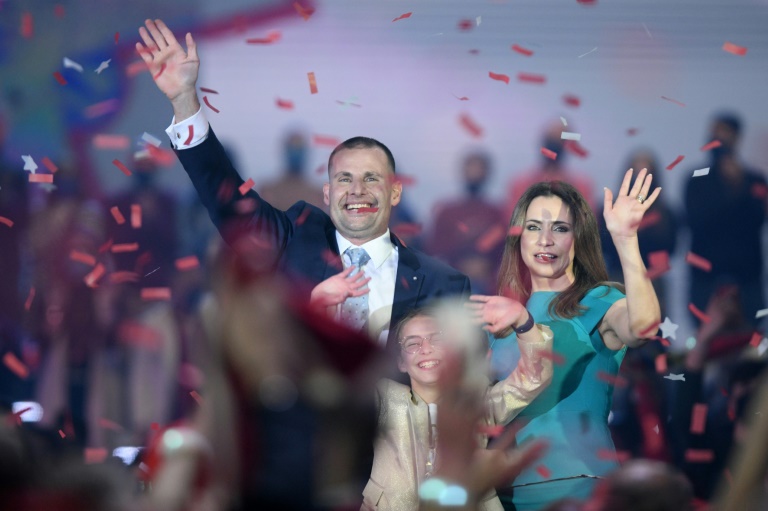Voters in Malta cast their ballots Saturday in general elections expected to secure another term for the government, despite concerns about corruption in a nation still rocked by the assassination of a journalist.
Opinion polls ahead of the vote pointed to a decisive win for Labour Prime Minister Robert Abela, who has campaigned on his handling of the coronavirus pandemic and his party’s economic record during nine years in power.
However, there were indications that turnout — which in recent general elections topped 90 percent — has fallen, amid complaints about a lacklustre campaign, coronavirus restrictions and the shadow of Russia’s invasion of Ukraine.
Labour is also still tainted by the high-level corruption exposed by journalist Daphne Caruana Galizia, who was killed by a car bomb in October 2017 — a murder that shocked the world.
A public inquiry last year found the state under then Labour prime minister Joseph Muscat created a “culture of impunity” in which her enemies felt they could silence her.
Muscat had already stepped down in January 2020, after public protests at his perceived attempts to shield allies from the probe into her death.
He was replaced in a Labour party vote by Abela, who has since moved to strengthen good governance and press freedom, although Caruana Galizia’s family say he has not gone far enough.
At a final rally Thursday, Abela urged flag-waving supporters to “trust me with my first mandate so I can continue changing things”.
The opposition Nationalist Party has sought to press the issue of corruption, with leader Bernard Grech warning “our democracy is at stake”, but is facing its own internal divisions.
At 2:00pm, seven hours after polls opened, just over 40 percent of the 355,075 registered voters had cast their ballots, the Electoral Commission said — 12 points below the same level in 2017 elections.
“The two leaders agree on many things.
They all work for the same aim, but then who delivers?” said Rosanna Cutajar, a 42-year-old sales assistant, after voting in Valletta.
Polls close at 10:00 pm (2100 GMT), with provisional results expected by lunchtime Sunday.
– Money in their pockets –
Located off the coast of Sicily, Catholic-majority Malta is the smallest and most densely populated country in the European Union, with around 516,000 people living in 316 square kilometres (122 square miles).
Its location in the middle of the Mediterranean made it a repeated target for invaders down the centuries, resulting in a rich culture, with the 16th-century walled capital designated a UNESCO world heritage site.
Despite few natural resources, the former British colony has built a thriving economy based largely on tourism, financial services and online gaming, and residents enjoy a generous welfare state.
But it has long fought allegations it acts as a quasi-tax haven while international anti-money-laundering organisation FATF grey-listed Malta last year.
Business leaders hope recent progress will see it removed this summer.
The archipelago has also been criticised by the EU and anti-corruption campaigners for its “golden passports” scheme, which awards citizenship to wealthy investors.
Under political pressure, Abela suspended the scheme for Russians and Belarusians after the Ukraine invasion.
Coronavirus sent the economy into freefall, but the government supported individuals and businesses, and growth last year topped nine percent.
“Ever since Labour has been in, it’s always worked for the people,” said Josephine Canilleri, 71, having a coffee in the city of Mosta with her friends.
“If there is corruption right now, at least the people are not suffering, they have money in their pocket.
Don’t touch their pocket and the people are OK.”
But there are others like Joanne O’Donnell, 37, a Maltese who returned from her home in Denmark to vote, who insist “the Labour party has to get out of government”.
“In the eyes of people (abroad), Malta has gone from a paradise to that place where Daphne was murdered,” she said, adding: “I’m not proud of that.”
– ‘We can’t breathe’ –
The environment is another big issue here, green spaces squeezed out by a construction boom, the coast filled with modern apartment blocks and the roads snarled with traffic.
“There are trucks everywhere, we can’t breathe, there’s dust, there’s concrete — no trees, no green, zero,” complained Vincent Borg, 68, buying breakfast in Mosta.
Both main parties have pledged to do more to protect the environment.
There is a green party, the ADPD, but no third party has held even a seat in Malta’s parliament since before independence in 1964.











